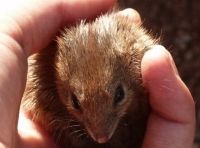Researchers have fascinating new details of the extreme and unusual mating habits of the kaluta (Dasykaluta rosamondae)—a tiny, mouse-sized marsupial which is only found in the arid Pilbara region of northwestern Australia.
According to a study published in the Journal of Zoology, kaluta males die en masse after a single breeding season, which causes them so much stress and exhaustion that the immune systems of the animals fail. This is perhaps not surprising given that they mate with multiple partners—sometimes for up to 14 hours at a time—within the space of one short week.
"Males were regularly captured in healthy numbers throughout the study, except immediately after the mating seasons, when no males were captured," Genevieve Hayes, lead author of the study from the University of Western Australia's School of Biological Sciences, said in a statement.
"This, coupled with other research in the field and laboratory, strongly suggests that males die after the mating season," she said.

During this season, the female kalutas—who are able to store sperm from various partners—mate frequently with different males. This means that a single of litter of eight babies could have as many as three fathers.
"That means that males also have to mate a lot, and have good quality sperm—and lots of it—to outcompete rival males. This intense investment in reproduction, evidenced by their large testes, appears to be fatal for males," Hayes said.
This type of mating behavior, where a generation of males dies off in their first season, is known as "male semelparity." Unsurprisingly, given its extreme nature, this strategy is very rare in the animal kingdom.
In fact, scientists only know a few dozen species that mate in this way, most of which—unlike kalutas—are invertebrates, or animals without a backbone, The New York Times reported.
Kalutas belong to the animal family Dasyuridae of marsupial mammals which contains around 60 species, including the famous Tasmanian Devil. According to the researchers, around a fifth of the species in this family exhibit male semelparity—the only mammals to do so. However, until the latest research, it was not clear whether kalutas were included.
Kalutas lie on a separate branch of the evolutionary tree from other dasyurids, which exhibit male semelparity, indicating that this strategy evolved twice independently in the animal family.
"By confirming semelparity in kalutas, we have shown this extreme mating strategy has evolved at least twice in the same family of carnivorous marsupials," Hayes said.
"The study sheds some light on the life of this relatively unknown creature. Despite its extreme mating behaviour, the kaluta appears to be doing well, making it an interesting case study," she said.
Uncommon Knowledge
Newsweek is committed to challenging conventional wisdom and finding connections in the search for common ground.
Newsweek is committed to challenging conventional wisdom and finding connections in the search for common ground.
About the writer
Aristos is a Newsweek science reporter with the London, U.K., bureau. He reports on science and health topics, including; animal, ... Read more





